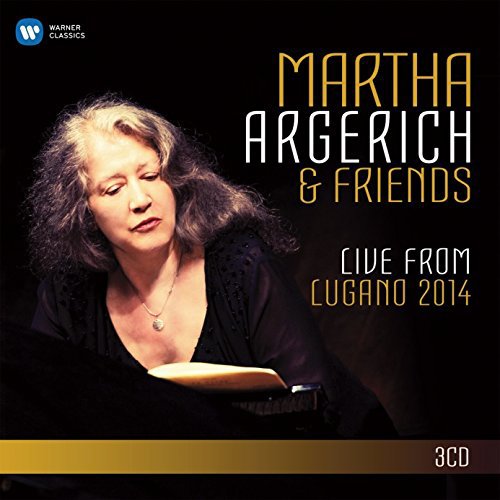Martha Argerich & Friends: Live from Lugano 2014
View record and artist detailsRecord and Artist Details
Composer or Director: Mieczyslaw Weinberg, Wolfgang Amadeus Mozart, Francis Poulenc, Alexander Scriabin, Felix Mendelssohn, Ludwig van Beethoven, Darius Milhaud, Alexander Borodin, Frank Bridge, Gabriela Montero
Genre:
Chamber
Label: Warner Classics
Magazine Review Date: 08/2015
Media Format: CD or Download
Media Runtime: 195
Mastering:
DDD
Catalogue Number: 2564 61346-01

Tracks:
| Composition | Artist Credit |
|---|---|
| Concerto for Piano and Orchestra No. 20 |
Wolfgang Amadeus Mozart, Composer
Jacek Kaspszyk, Conductor Martha Argerich, Piano Orchestra della Svizzera Italiana Wolfgang Amadeus Mozart, Composer |
| (7) Variations on Mozart's 'Bei Männern, welche |
Ludwig van Beethoven, Composer
Ludwig van Beethoven, Composer Martha Argerich, Piano Mischa Maisky, Cello |
| (La) Création du monde |
Darius Milhaud, Composer
Darius Milhaud, Composer Dora Schwarzberg, Violin Eduardo Hubert, Piano Mark Drobinsky, Cello Michael Guttmann, Violin Nora Romanoff-Schwarzberg, Viola |
| Symphony No 1, arr. 4 hands |
Felix Mendelssohn, Composer
Akane Sakai, Piano Anton Gerzenberg, Piano Daniel Gerzenberg, Piano Felix Mendelssohn, Composer Lilya Zilberstein, Piano |
| Piano Quintet |
Alexander Borodin, Composer
Alexander Borodin, Composer Alexander Mogilevsky, Piano Andrey Baranov, Violin Géza Hosszu-Legocky, Violin Jing Zhao, Cello Nora Romanoff-Schwarzberg, Viola |
| Sonata for Cello and Piano |
Frank Bridge, Composer
Frank Bridge, Composer Gabriela Montero, Composer Gautier Capuçon, Cello |
| Sonata for Piano Duet |
Francis Poulenc, Composer
Dagmar Clottu, Piano Francis Poulenc, Composer Martha Argerich, Piano |
| Fantasy |
Alexander Scriabin, Composer
Alexander Mogilevsky, Piano Alexander Scriabin, Composer Daniel Rivera, Piano |
| Sonata for Violin and Piano No 5 |
Mieczyslaw Weinberg, Composer
Gidon Kremer, Violin Martha Argerich, Piano Mieczyslaw Weinberg, Composer |
Author: Harriet Smith
The first disc travels from dark to light, the Mozart followed by Beethoven’s (largely) uproarious Variations on ‘Bei Männern’ from The Magic Flute, with Maisky and Argerich egging each other on; they play with great spirit, without Maisky overdoing the vibrato as he sometimes can. From there to Milhaud’s arrangement for piano quintet of his own La création du monde. To my ears, this isn’t a patch on the orchestral version, and it’s not the easiest of pieces to bring off – there are more than a few textural challenges – and on occasion I found first violinist Dora Schwarzberg’s vibrato-rich tone somewhat overbearing. But the Fugue is delivered with due welly, even if the scherzo is slightly raw in places. Similarly, Busoni’s arrangement of Mendelssohn’s First Symphony, which opens disc 2, sounds a bit relentless in its eight-hands, two-pianos garb. The accentuation can border on the overenthusiastic on occasion; and though it’s generally extremely well co-ordinated, there is the odd patch of hurrying. The finale has plenty of con fuoco but again I’d question whether this is a better medium than Mendelssohn’s original.
Poulenc fares particularly well on this set, Lugano regular Gautier Capuçon joined by Francesco Piemontesi for a rendition of the Cello Sonata that balances warmth and wit, anguish and seriousness, with the more poignant elements (particularly the slow movement) potently realised thanks to Capuçon’s songful tone. The brief four-hand Piano Sonata, too, played by Argerich and Dagmar Clottu, offers an ebullient reminder of Poulenc’s love for Stravinsky. Frank Bridge’s wartime Cello Sonata (this time Capuçon with Gabriela Montero) is particularly telling in its more nostalgic moments, with the cellist tending to soften its more modernist edges in the finale. The recording here, too, seems particularly close, catching every breath.
We turn to Russia for the remaining works. Borodin’s Piano Quintet is still not that well known, and to be honest it’s not difficult to work out why, despite a wholehearted performance. The brief first movement in particular seems to score more highly on gesture than on memorability. The best is found in the rambunctious Scherzo – where the rhythmic timing is pinpoint – which encloses an altogether gentler Trio.
The Scriabin Fantasy, however, is a more intriguing rarity, fervently played by Alexander Mogilevsky and Daniel Rivera. And to end, Weinberg’s Fifth Violin Sonata, a work Gidon Kremer has consistently championed. The piece exudes such intensity that you don’t need to know that it was written just after his release from Lubyanka prison in 1953. It unfolds from the opening recitative-like writing, via the energy and ire of the second movement (brilliantly caught by Kremer and Argerich, the latter letting rip in the final stomping piano chords) and an increasingly unfettered scherzo, to a finale that begins edgily and proceeds to work through the moods of the previous movements, before ending in a mood of serenity. It’s a riveting performance, and one of the highlights of a compelling box.
Discover the world's largest classical music catalogue with Presto Music.

Gramophone Digital Club
- Digital Edition
- Digital Archive
- Reviews Database
- Full website access
From £8.75 / month
Subscribe
Gramophone Full Club
- Print Edition
- Digital Edition
- Digital Archive
- Reviews Database
- Full website access
From £11.00 / month
Subscribe
If you are a library, university or other organisation that would be interested in an institutional subscription to Gramophone please click here for further information.




